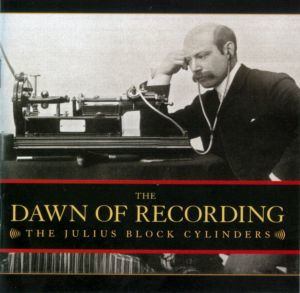
- Format: MP3

Perhaps a more accurate, if not as catchy, title for Marston's The Dawn of Recording would have been "The Dawn of Classical Music Recording," as that's what this is; the earliest surviving substantial collection of classical music recordings, made by Russian businessman and phonographic hobbyist Julius Block. Block's circle included some of the most important musicians in late nineteenth century Russia: Sergey Taneyev, Anton Arensky, the young Josef Hofmann, novelist Leo Tolstoy, and even Tchaikovsky. Block moved to Berlin in 1899 and didn't pick up his hobby again until the 1910s when he captured conductor Arthur Nikisch at the piano and recorded another talented youngster, Jascha Heifetz. His last recordings were made in Switzerland in the 1920s when he recorded pianist Egon Petri; along the way Block also recorded a number of singers, including Maria Klimentova-Muromtzeva who originated the role of Titania in Tchaikovsky's Eugen Onegin. Many of the folks who appeared before Block's horn never recorded again. In the wake of Block's death in 1934, parts of the collection were dispersed and lost, and some believed its very existence no more than a rumor. In the early '90s, eight Block cylinders were purchased by a private collector at auction, and subsequent research uncovered a large part of the collection -- more than 350 cylinders -- in Russia in 2002, where it had been taken during World War II after being removed from the Berlin Phonogrammarchiv.
Such a treasure trove is, naturally, unthinkable to listeners with even a little familiarity with the time period and the names involved: Taneyev? Arensky? Not to mention Tchaikovsky? Recordings of these people -- how can that be? Marston has worked out a three disc program for The Dawn of Recording: The Julius Block cylinders, consisting of 95 selections chosen on the basis of importance and sound quality. And in some cases the sound quality truly is surprising; the piano of Taneyev, while tinkly, rises out of the wax in Mozart's Fantasie in C minor, K. 396, with perfect clarity and every note audible; a couple of the Josef Hofmann items come booming out of the wax with confidence and surprisingly little noise. There are a small handful of items in this collection that reproduce with that kind of fidelity; others are either faint, besmirched with the telltale swish of a warped, damaged, or moldy cylinders or the notorious "horses hooves" of a cylinder riddled with cracks. If you've listened to a lot of cylinders, you know to put on different ears and listen through the noise. However, in cases where the noise is combined with especially faint sound, very little is audible; in the duet between Taneyev and Leo Conus, who did not otherwise make records, it can be hard to determine that there are two pianists playing, let alone being able to separate one pair of hands from another. And some tracks are simply inaudible; while soprano Therésè Leschetizkaya-Dolinina may have made her only recordings for Block, the first one included here is so faint that you can't figure out what it is and you can't hear her. Ironically, among the singers best represented is Madamoiselle Nikita, a teenaged diva from Kentucky who sang before Block's horn in 1890-1891; she was all the rage in Russia at the time, but ultimately disappeared into obscurity.
Nevertheless, one cannot fail to be amazed at the window some of this material opens on this epoch in Western culture, long obliterated by war and as distant a musical experience from our time as one can imagine. We can hear snatches of a choir in Moscow singing a Rachmaninoff liturgy in 1893, we can listen to extensive selections from pianist Paul Pabst, a Liszt student who died in 1897, and we can hear Tchaikovsky's speaking voice, captured along with that of Anton Rubinstein in 1890. This is on a cylinder Marston was not able to access directly and is heard from a version made by Russian officials where all of the noise between voices is dodged out. It's weird; it's like having a number of photo vignettes speaking to you from an old wooden frame. Tchaikovsky whistles a short passage, so at least we get a little music from him; cylinders made of his piano playing were duly noted in Block's register, but have yet to be located, indeed, if they exist at all.
As attractive as Marston's The Dawn of Recording: The Julius Block Cylinders might be to listeners devoted to some of these personalities -- and in the case of Tchaikovsky, were talking millions worldwide -- this really is the sort of thing best reserved for experts, people who are used to the sound of wax cylinders and are willing to tolerate their dumbness and preponderance toward noise. Nevertheless, those who dare go forward will find that the Russian section of The Dawn of Recording seems haunted by Tchaikovsky's ghost; this is what is left of the world in which he lived, and it's as close as we can come to it until we develop a way to travel backwards through time.